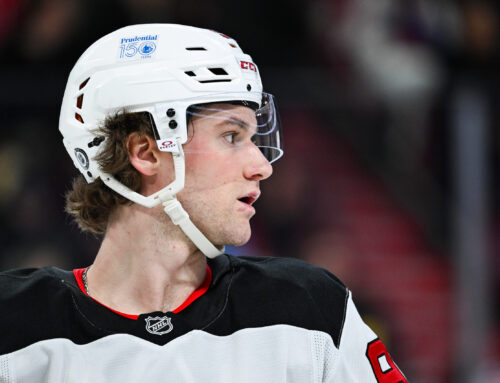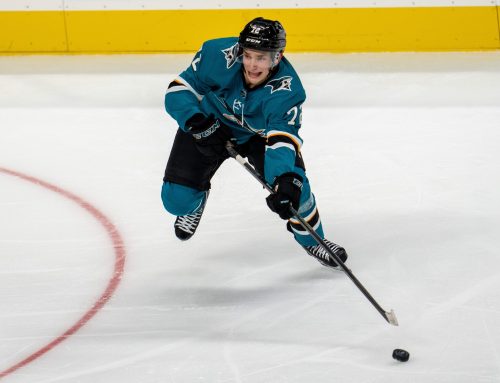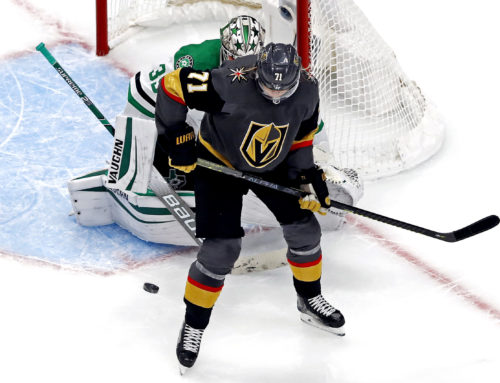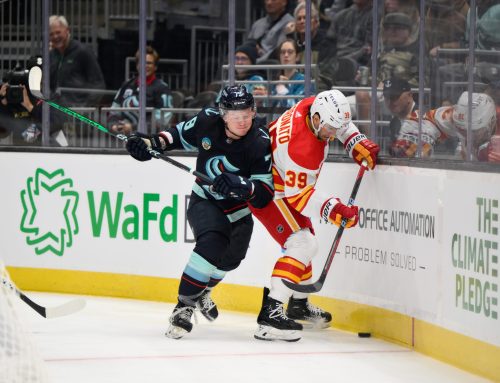
This week we take a look at a line Capitalizing on their chances, some Leafs that may be falling, and Senators losing their seat. I usually reserve my Twitter account @BrennanDeSouza for injury updates, so you can pick up players that become relevant when others are due to miss time. However, going forward I’ll be using it to point out notable line changes as well, so you’re the first to snag a guy like Tom Wilson when he’s playing with Ovi and Backstrom.
Alexander Ovechkin – Nicklas Backstrom – Tom Wilson
Team ES Point Production: 17 | Line ES Point Production: 12 (71% of team)
For years Alexander Ovechkin and Nicklas Backstrom have been one of the deadliest duos in the league. Backstrom being mister assister, and Ovi being mister wrister. While Evgeny Kuznetsov was skating alongside the Great Eight to start the season, Backstrom has since reclaimed his spot beside Ovechkin. Tom Wilson has rounded out the trio and their 59.26 CF% together shows a great ability to drive offense as a unit.
I’ll be the first to say I avoided drafting Ovi this season after Washington Capitals’ owner Ted Leonsis supported him going to the Olympics. Although it became less and less likely that Ovi was going to PyeongChang for the 2018 winter games, I figured I’d just side step the whole situation. While the Capitals’ captain has proven me wrong thus far, the numbers do suggest some regression going forward. Now the numbers aren’t crazy unsustainable, but it seems likely that his 5 on 5 shooting percentage of 11.11% drops a little (Averaged 9.18% last three seasons) and that 1040 PDO starts to get closer to 1000. That being said, it’s difficult to find guys capable of scoring 50 goals, especially on the left wing.
Despite a cold stretch this season that saw him go pointless for seven straight games, Nicklas Backstrom has tallied 25 points in 30 games. He is currently seeing 72% of the team’s total power play ice time (up from 62% in past two seasons), but is surprisingly on pace for less power play points (27 this year as opposed to 34 and 30 in past two). Another interesting note can be found in his IPP. In past seasons, Backstrom was getting a point on 70-80% of goals scored while he was on the ice, but that number currently sits at 61%, so perhaps there is still room for improvement.
Tom Wilson has seven points in his last three games. Before you go rushing to add him, keep in mind that after four seasons in the NHL his highest point total sits at 23. Does he have value when skating beside Ovechkin and Backstrom? Of course. But the problem is that he’s not going to remain on this line forever. With Andre Burakovsky healthy again, there’s a long list of players that coach Barry Trotz is comfortable with playing on Washington’s top line (including Devante Smith-Pelly and Jakub Vrana). One look at Wilson’s stat line would tell you his role on the Capitals is much more physical than offensive. While Wilson holds some short-term value, expect to see many variations of Washington’s top line as the season progresses.
Bobby Ryan – Derick Brassard – Mark Stone
Team ES Point Production: 5 | Line ES Point Production 0 (0% of team)
The Senators have been shutout in three of their last four games. They have one win in their last 12 games. To say they’re struggling right now is an understatement. While there has been a lot of buzz surrounding Erik Karlsson’s future with the team, he has made it clear that he is comfortable in Ottawa. I mention Karlsson because his offensive abilities have a huge impact on how productive the forwards are. Few blueliners are able to turn defense into offense as smoothly as Karlsson does with his speed, but offseason surgery seems to have slowed him down a touch. “You can play through it, but it will take a while before you get accustomed to it” Karlsson revealed in an interview with Arash Madani. With one point in his last twelve games, it wouldn’t be outrageous to suggest a relation between his struggles and those of the team. In my opinion, your faith in the trio of Ryan, Brassard, and Stone should depend on your faith in Erik Karlsson turning it around. A CF% of 46.81 doesn’t instill a lot of confidence in their ability to generate offense.
Mark Stone is currently the most valuable member of this line, but while his 25 points in 28 games this season are impressive overall, he has gone four straight games without a point. In the past three seasons, Stone has consistently produced at 60-point pace. This year, he’s on pace to break the 70-point barrier, so maybe it’s that famous fourth year breakout everyone talks about! While I believe Stone has the individual talent to be a 70-point player in the NHL, I would temper my expectations until the Senators figure things out. Although his high career shooting percentage (16.2%) shows he’s an efficient shooter, his 20.6% shooting percentage on the season should see a bit of regression. That being said, his ice time has gone up by more than two minutes since last year (20:50 from 18:31) which includes a half-minute increase on the power play (3:37 from 3:06. Add in the fact that he’s shooting more than ever before, and you have a recipe for new career highs.
After flirting with the 60-point mark in his final seasons as a Ranger, the Senators were hoping for more of the same when Derick Brassard arrived in Ottawa, but that hasn’t been the case. His first season as a Senator was a disappointment, as he totalled just 39 points in 79 games. The 2017-2018 season has come with an increase an ice time overall (17:19 to 18:56), but most notably on the power play (2:34 to 3:27). While the team is putting him in a position to succeed, there is a chance he gets traded before the deadline if Ottawa continues to stuggle.
My opinion on Bobby Ryan hasn’t changed since I talked about him skating with Matt Duchene a few weeks ago. Instead of throwing more numbers at you, I’ll remind you that he has suffered three separate hand-related injuries in 2017 alone. Stick-handling and shooting obviously aren’t going to be at the same level following a myriad of finger fractures, so don’t expect too much from him going forward. Although they’re different players, I feel like Brendan Gallagher is a good example of how a hand injury might hinder production. After missing time last season, he was only able to score 10 goals in 64 games. Fast forward to this season and he has 12 goals in 31 games. Just a little food for thought.
James van Riemsdyk – Tyler Bozak – Mitchell Marner
Team ES Point Production: 10 | Line ES Point Production: 7 (70% of team)
When your ‘third’ line consists of two guys coming off 60-point seasons and another one fresh off a 55-point campaign, I think it’s fair to say your team has some depth scoring. It also doesn’t hurt when they’re getting favourable matchups and putting pressure on other teams to play in their own zone as a 54.95 CF% would indicate. Despite this line’s recent production, their lack of ice-time limits their fantasy hockey value.
After a stellar rookie season, the dreaded sophomore slump seems to have claimed Mitch Marner and disappointed many of his owners. While the beginning of the season saw him on the fourth line with Matt Martin, he has since been reunited with his line mates of last season. Overall, Marner’s ice time has dropped by more than a minute (16:49 to 15:25) and he isn’t shooting as much as last season. Although he was drafted fourth overall in 2015 and should be great asset in the future, his inconsistent usage this year makes even 55 points seem like a stretch.
Gone are the days of Tyler Bozak as the Leafs number one center. With the young guns taking over in Toronto, Bozak has seen his ice-time drop to under 15 minutes a game. He’s currently on pace for 38 points and there’s really no solid evidence to hope for too much more. His point per game pace hasn’t dropped below 0.60 in recent years and currently sits at 0.47, while that may provide a small beacon of hope, his reduced role might be enough to justify the decrease.
James van Riemsdyk has been the most productive of the trio, but the numbers suggest it’s time to sell-high. It’s easy to get excited when you see he has scored 14 goals in 30 games, but then you notice he’s done it on only 80 shots. A 17.5% shooting percentage is difficult for the best of shooters to maintain, but it becomes even more difficult when your career shooting percentage is 11.3%. Like Marner and Bozak, JVR’s ice-time has taken a big hit this season (from 15:53 to 14:15), and makes it less likely he returns to the 60-point form of last season. All this being said, his contract does expire at the end of the campaign and players have a tendency to play for job security. While he might not be a Leaf by the end of the year, it seems he wants to stay in Toronto and be part of the promising future they have.
Interesting Line Changes
If you want to see a team’s line combinations in their most recent game check it out over here. I’ll try to point out some notable shake ups every week that impact your fantasy roster. Keep in mind sometimes these lines are thrown together by a coach in desperation to turn a game around and aren’t set in stone.
CHI: Alex DeBrincat – Jonathan Toews – Brandon Saad
DAL: Remi Elie – Tyler Seguin – Devin Shore
DAL: Jamie Benn – Radek Faksa – Tyler Pitlick
EDM: Milan Lucic – Connor McDavid – Jesse Puljujarvi
EDM: Leon Draisaitl – Jujhar Khaira – Ryan Strome
LA: Tanner Pearson – Anze Kopitar – Tyler Toffoli
NJ: Taylor Hall – Nico Hischier – Jesper Bratt
NSH: Filip Forsberg – Pontus Aberg – Calle Jarnkrok
PHI: Michael Raffl – Valtteri Filppula – Jakub Voracek





 EDM
EDM FLA
FLA MIN
MIN DAL
DAL T.B
T.B L.A
L.A CBJ
CBJ S.J
S.J VAN
VAN CHI
CHI DET
DET NYI
NYI
